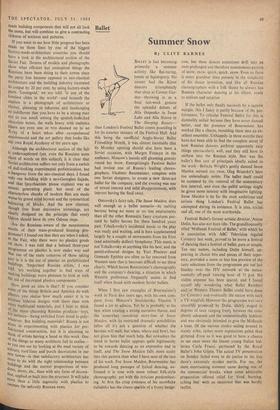Ballet
Summer Snow
By CLIVE BARNES
BALLET is fast becoming primarily a summer activity like flat-racing, tennis or lepidoptery. No sooner had the Kirov dancers triumphantly shut shop at Covent Gar- den—throwing in as a final last-week gesture the splendid debuts of Alla Osipenko in Swan Lake and Alla Sizova in The Sleeping Beauty— than London's Festival Ballet comes pounding in for its summer tenancy of the Festival Hall. And this being the unofficial Anglo-Soviet Ballet Friendship Month, it was almost inevitable that its Monday opening should also have been a Soviet occasion, with Margot Fonteyn in the audience, Moscow's laurels still gleaming greenly round her brow. Enterprisingly Festival Ballet had invited one of Russia's leading choreo- graphers, Vladimir Bourmeister, complete with two Soviet designers, to create a new three-act ballet for the company, and the evening was one of mixed interest and mild disappointment, with interest having the final sway.
Ostrovsky's fairy-tale, The Snow Maiden, does well enough as a ballet scenario—its melting heroine being no more or no less unattainable than all the other Romantic faery creatures pur- sued by ballet heroes for these hundred years past. Tchaikovsky's incidental music to the play was ready and waiting, and is here supplemented largely by a couple of movements from his First (and admittedly dullest) Symphony. This music is not Tchaikovsky at anything like his best, and the pastel-coloured designs by Yuri Piminov and Gennady Epishin are often so far removed from Western taste that it becomes difficult to see them clearly. Which leaves Bourmeister's choreography and the company's dancing, a situation in which Western preference frequently seems to find itself when faced with modern Soviet ballets.
When I first saw examples of Bourmeister's work in Paris five years ago, with his own com- pany, from Moscow's Stanislavsky Theatre, .1 found a lot to admire. Yet he is probably at his best when treating a strong narrative theme, and the somewhat anecdotal story-line of Snow Maiden, with its restricted dramatic possibilities (after all it's not a question of whether the heroine will melt, but when, where and how), has not given him that much help. But nowadays the trend in Soviet ballet appears quite legitimately to be towards dancing as an expressive end in itself, and The Snow Maiden falls more easily into this pattern than what I have seen of the rest of his work. For Snow Maiden, Bourmeister has produced long passages of lyrical dancing, en- livened it is true with more robust folk-style choreography, yet with the lyricism predominat- ing. At first the crisp evenness of his snowflake ballabiles has the chaste sparkle of a frosty hedge- row, but these dances sometimes drift into an over-prolonged and therefore monotonous pattern of snow, snow, quick, quick, snow. Even so there is more grandeur than poverty in the simplicity of his dance invention, and like all Russian choreographers with a folk theme he always has Russian character dancing at his elbow, ready to enliven and surprise.
If the ballet only finally succeeds by a narrow margin, this I fancy is partly because of the per- formance. To criticise Festival Ballet for this is damnably unfair because they have never danced better, and the presence of Bourmeister has worked like a charm, moulding them into an ex- cellent ensemble. Unhappily in three months they have not been able to find the complete secret of how Russian dancers perform apparently easy things spectacularly well, and they still have to unthaw into the Russian style. Nor was the ballet's first cast of principals ideally suited to the work—Belinda Wright's gently danced Snow Maiden seemed too twee, Oleg Briansky's hero too unbendingly noble. The ballet itself could be tautened by the removal of the unnecessary first interval, and even the pallid settings might be given more interest with imaginative lighting. Snow Maiden is by far the most ambitious and serious thing London's Festival Ballet has attempted during its existence. It is also, icicles and all, one of the most worthwhile.
Festival Ballet's former artistic director, Anton Dolin, has also not been idle. The grandiloquently titled 'Midlands Festival of Ballet,' with which he in association with ABC Television regaled Coventry last week, proved to be more a festival of dancing than a festival of ballet, pure or simple. Ten star names, including Dolin himself, ap- pearing in choice bits and pieces of their reper- tory, provided a more or less live preview of the tasty selections from the programme put out last Sunday over the ITV network at the monu- mentally off-peak viewing hour of 11 p.m. No visible expense has been spared, and I found myself idly wondering what Ballet Rambert and/or Western Theatre Ballet could have done for Coventry and eventually the nation with such a TV windfall. However the programme was very smoothly produced by Dolin, slickly staged in degrees of taste ranging freely between the com- pletely adequate and the unmentionably hideous, and was obviously intended to give the Midlands a treat. Of the various etches sailing around in stately orbit, rather more reputations paled than glittered. Even so it was good to have a chance to see once more the lissom young Italian bal- lerina Carla Fracci, partnered by the Royal Ballet's John Gilpin. The actual TV presentation on Sunday failed even to do justice to the live show's extremely modest merits. For me, the most entertaining moment came during one of the commercial breaks, when some admirable preparation offered relief for `tired, burning, aching feet' with an insistence that was hardly tactful.


















































 Previous page
Previous page